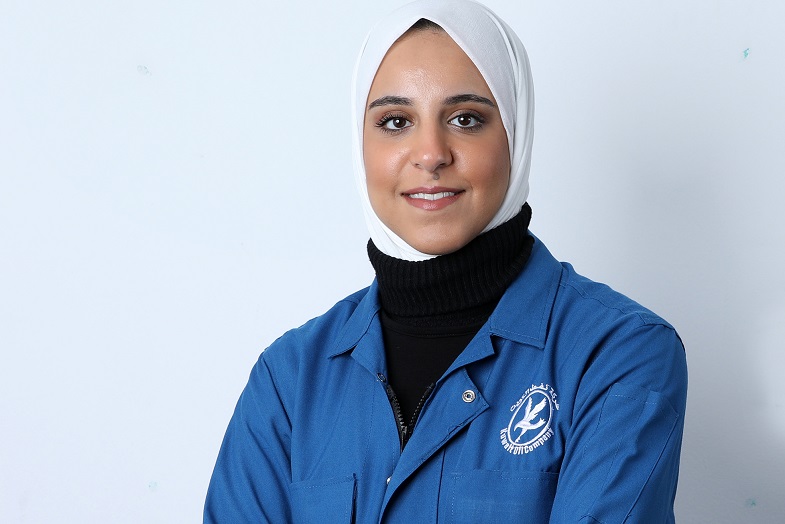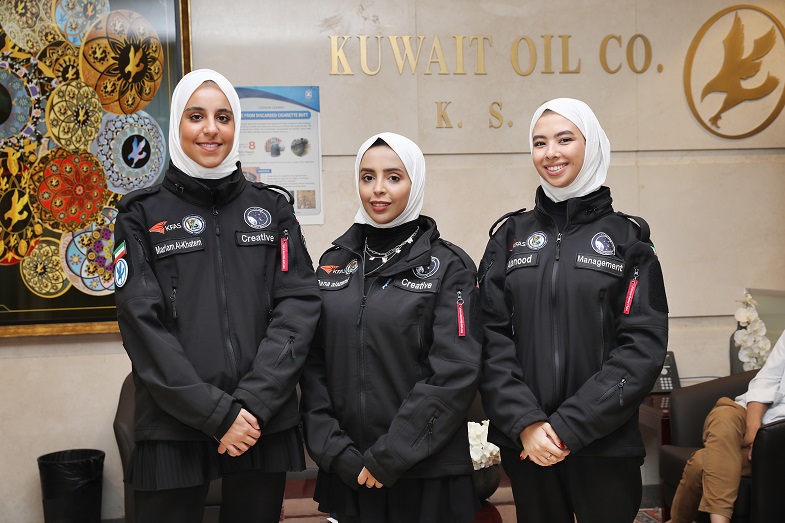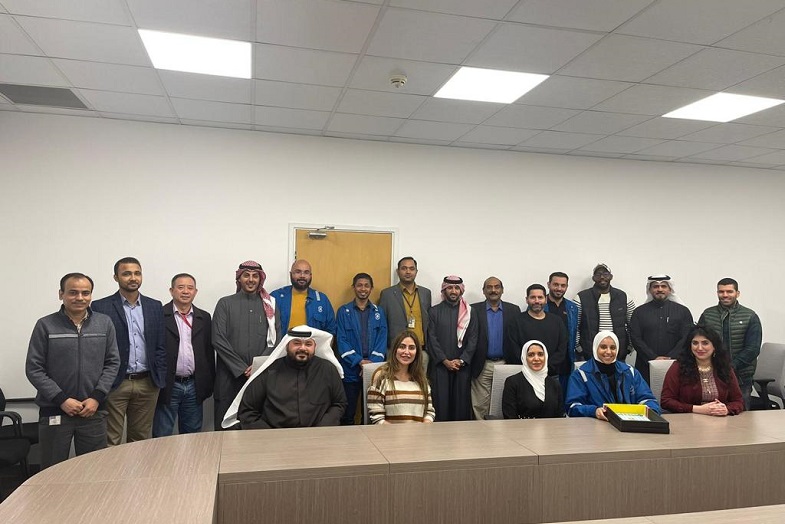This year has a promising start for the State of Kuwait, especially in the aftermath of an achievement that will help to place it in the foreground of international efforts in the field of space.
On Tuesday, January 3rd, Kuwait launched its first artificial satellite “KuwaitSat1" from the Cape Canaveral air base, Florida, the United States, through the “Falcon9" space shuttle of Space-X, to be the first satellite of its kind to be launched in this way.
As it has been the case for any other achievement, KOC has its own trace upon this one, too. The company is always either the owner of the achievement or the major contributor to its realization. In this case, we are talking about Mariam al-Khatem, senior geologist at the Exploration Assessment Team (1) of the Exploration Group, which took part in this achievement of which Kuwait has always dreamt.
In this article, we will shed light on this achievement and be briefed about Mariam's participation in it, which is a source of great pride for KOC.
The State of Kuwait… heading to Space!

Finally, KuwaitSat made its way to space after all the preparations that have been made for it to send pictures to the ground station located at the Faculty of Science, Kuwait University, as soon as it is put into orbit around the earth.
This project, which is related to Kuwait University and financed by the Kuwait Institute for Scientific Advancement, comes under the slogan “Kuwait heading to space". The dream became a reality after three years of continuous work by a young Kuwaiti team. This project aims to build capacities in the field of construction, design and management of artificial satellites and acquire the necessary training and field experience.
Last April, i.e. three months after the launch, it was declared that the satellite captured its first pictures of Kuwait, which were integrated in a mosaic, providing a nice view of the eastern part of the country. No doubt, this heralded a fresh start to enhance the position of Kuwait in the field of space as well as to develop its scientific and technological capacities. It also enhances Kuwait's R&D capacities in the field of space science and reflect its commitment to the promotion of the culture of creativity and sustained development.
“KuwaitSat1" is a Nanometric artificial satellite used to control the land and provide accurate information for urban & agricultural planning, environmental control and natural resources management. This satellite is also equipped with a high-resolution camera of an aspect ratio of 39 meters, which allows it to take pictures that provide valuable information to support sustainable development in the country. This satellite will orbit the earth for an expected life span of 25 years.
First participation
Our distinguished guest, Mariam al-Khatem, who added that she joined the National Project of the first Kuwaiti Artificial Satellite by means of a link through which she submitted her CV. 45 candidates were then chosen and interviewed during a training camp that was designed to make sure that only the best of the best are chosen.
Al-Khatem pointed out that the team members are from Kuwait University and other universities, companies related to the Kuwait Petroleum Company (KPC), the National Petroleum Company (KPC) and the Petrochemical Industries Company. She was the only candidate from KOC.
She was still a student when she joined the project in 2019, as she said,. This took place after she became aware of the project through flyers that were distributed at the Faculty of Sciences, Kuwait University. Preparations were slowed down by the spread of the Corona pandemic. It was the time when she graduated. She also pointed out that she exploited the lockdown to take part in many virtual forums on the internet and receive rigorous training from Kuwait University and other universities, like the University of Colorado, USA. 
Al-Khatem clarified that her journey started at Kuwait University, the department of physics, which was headed by Dr. Hala al-Jassar, and sponsored by the Kuwait Foundation for the Advancement of Sciences (KFAS). This was the longest part of the process indeed. She drew our attention to the fact that part of the training was in coordination and cooperation with Muhammad Bin Rashed Centre for Space Sciences in the UAE.
She added that training continued throughout the period of the pandemic during which the participants continued to learn and acquire knowledge to build their capacities, which was one of the major pillars of the project. Once the precautions related to the pandemic were removed, another group of candidates joined while others left for different reasons. The journey continued non-stop, though.
Secondary teams
Al-khatem explained how the main team, which is made up of 45 young men and young women, is divided into five secondary teams, describing the role of each in this context.
She revealed that the first team, i.e. the technical team, was responsible for the technical parts of the artificial satellite, sub-system, electrical engineering, mechanical engineering and computer engineering. The second team, which is the Creativity Team (of which she is part), was in charge of social media and the documentation of all the stages of the project.
The third team, which is the Ground Station Team, was responsible for receiving and emitting signals to the satellite, knowing that a ground station was built at Kuwait University and financed by the Kuwait Foundation for the Advancement of Sciences (KFAS), with the help of specialists from abroad.
The fourth team is the team of implementation, of which al-khatem is also part, which is especially made up of geologists, maritime scientists and architectural engineers. They are in charge of processing the pictures after they are received from the satellite. These pictures are then reused in making geological research, sea science research, etc.
Team five is the Control Team. It is made up by Dr. Hala Al-Jassar, the project manager, and Dr. Yasser Abdulraheem from the Faculty of Electrical Engineering, manager of student training and Dr. Ahmad Al-Kindari as operations manager. Dr. Ahmad is a retired staff colonel from the Ministry of Defense.
Personal History
Mariam al-Khatem's personal history is crucial for knowing how she happened to become part of such unprecedented achievement. Her personal history reveals how passionate she was!
Al-khatem said she studied geology at Kuwaiti University and specialized in petroleum geology. Her interest in this field dated from the early years of her childhood. This means that perseverance is the key to the realization of dreams.
The first book she read in her life was about astrology. She is grateful because her family gave her full support in her search for achieving her dreams. She was always given astrology books. She got telescopes as birthday gifts from her uncles. Her brother is also part of the team. This shows that the path of outstanding achievements starts from home and then passes through academic channels. As a young person, she was given unlimited support by KOC in order to excel in her field. The company made sign of an unshakable belief in the capacities of the country's youth for excellence on all levels. Though she was a new recruit, the company believed in her capacity for excellence.
Proudly heading for more…
She revealed that the team is now proudly readying itself for launching the second satellite KuwaitSat2, which is also financed by the Kuwait Foundation for the Advancement of the Sciences (KFAS), but this time, it will be a bigger and more developed program. Team members are also thinking about launching the first center for space research. The future projection is that Kuwait will have its own space agency.
She added that the volunteers, of whom the team was made up, were up to the challenge because they are young citizens who wanted to raise the flag of Kuwait very high in the sky. By their determination, perseverance and hard work, they were able to go beyond expectations.
She explained this by the fact that all of them had a personal craving in this field, and consequently they had high motivation and inspiration. Their ages ranged from 22 to 35 years old and females represented 70% of them.
On the link between this project and KOC, al-Khatem said that the company uses satellite pictures in the fields Exploration & Development. The company intends to have a satellite of its own.
Honoring and support
Senior geologist, Mariam al Khatem, was honoured by the Exploration & Assessment Team (1) of the Exploration Group in KOC, for her contributions for the launch of the first Kuwaiti artificial satellite.
In recognition for her efficiency, Mariam was given a commemoration gift by Team Leader Mishaal al-Wadi. This underscores KOC's adoption of promising young talents and rewarding their excellence.
